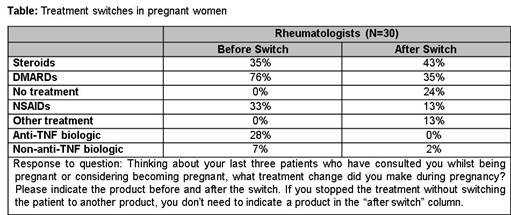Session Information
Session Type: Abstract Submissions (ACR)
Background/Purpose
Rheumatological diseases often affect women of reproductive age and can impact pregnancy outcomes. There is a need to understand how patients (pts) are managed by their rheumatologists. We investigate the treatment pathway and care of women with rheumatological conditions who become pregnant.
Methods
Two online surveys, one in rheumatologists and one in pts, were undertaken. Surveys were conducted in the US, UK, Germany and Mexico. Rheumatologists were questioned on the last three pts who they have consulted whilst being pregnant or considering becoming pregnant. Rheumatologists were questioned on pts with rheumatoid arthritis (RA) and lupus. Pt survey included women with RA who had been pregnant in the past 2 years. Pts were questioned on their interactions with rheumatologists and obstetrics/gynaecology physicians (OBGYN).
Results
Conclusion 
Disclosure:
M. E. B. Clowse,
UCB Pharma,
5;
M. Khamashta,
INOVA diagnostics,AstraZeneca,Medimmune,UCB ,GSK,
5;
D. S. Pushparajah,
UCB Pharma,
3;
E. Chakravarty,
UCB,
5.
« Back to 2014 ACR/ARHP Annual Meeting
ACR Meeting Abstracts - https://acrabstracts.org/abstract/care-of-women-with-rheumatological-conditions-during-family-planning-and-pregnancy/
